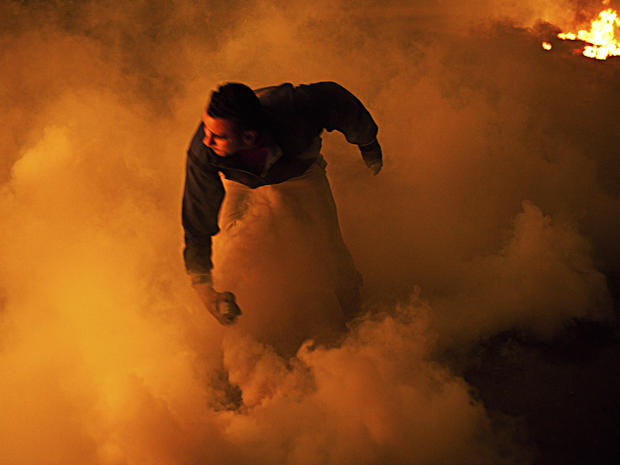Egypt protests, violence continue in spite of President Morsi declaring state of emergency
Updated at 2:38 p.m. Eastern
CAIRO Riot police fired tear gas at rock-throwing protesters in central Cairo on Monday, a day after Egypt's president declared a state of emergency in three provinces hit hardest by political violence and vowed to deal "firmly and forcefully" with the unrest roiling the country.
The eruption of violence, which began around Friday's second anniversary of the uprising that toppled longtime ruler Hosni Mubarak, has plunged Egypt once again into political turmoil and exposed the deep fault lines running through the country. More than 50 people have been killed in the unrest, which is fueled by anger over the policies of the country's new Islamist leader and the slow pace of change.
The most recent death was reported near Cairo's landmark Tahrir Square on Monday.
President Mohammed Morsi, who has struggled to address the country's daunting social and economic problems since taking power in June, declared in a televised speech late Sunday a 30-day state of emergency in the cities of Port Said, Ismailiya and Suez and their surrounding provinces in an attempt to quell the unrest. The military was deployed in Suez on Friday and in Port Said the next day. The two cities have been hit the hardest by the violence.
Protesters in all three cities poured into the streets after Morsi's speech to reject both him and his state of emergency, which includes a curfew from 9 p.m. to 6 a.m. In Port Said, where 44 people killed in rioting over the weekend, at least 2,000 protesters chanted against the Egyptian president and the Muslim Brotherhood, the Islamist group from which he hails.
The unrest in Port Said was sparked by a court conviction and death sentence for 21 defendants involved in a mass soccer riot in the city's main stadium on Feb. 1, 2012 that left 74 dead. Most of those sentenced to death were local soccer fans from Port Said, deepening a sense of persecution that Port Said's residents have felt since the stadium disaster, the worst soccer violence ever in Egypt.
- Egypt's Morsi declares state of emergency
- Angry protests leave 7 dead on Egypt anniversary
- Egypt: More than 110 hurt in 2nd anniversary protests
At least another 11, most of them in Suez, died in clashes Friday elsewhere in the country during rallies marking the second anniversary of the uprising that toppled Mubarak nearly two years ago. Protesters used the occasion to denounce Morsi and the Brotherhood, which emerged as the country's most dominant political force after Mubarak's ouster.
Egypt's Al-Ahram newspaper quoted Abdel-Rahman Farah, general manager of Port Said hospitals, as saying there were 21 cases of injury by live ammunition, three of whom remained in critical condition. The 29 victims killed during clashes around the Port Said prison were reportedly buried Sunday before police or prosecutors could examine the remains.
Egypt's Interior Ministry denies using live ammunition against the protesters.
In his televised address, Morsi also warned that he would not hesitate to take more action to stem the violence.
Angry and at times screaming and wagging his finger, the Egyptian leader also invited the nation's political forces for talks to resolve the nation's crisis, saying "a dialogue between the sons of the nation is indispensable and is the only way to shepherd Egypt to security and stability."
The main opposition coalition rejected Morsi's call for national dialogue to resolve the crisis, demanding that he first make deep concessions to break what opponents call the monopoly that Islamists have tried to impose on power. The National Salvation Front said it wouldn't join any dialogue until Morsi forms a national unity government and begins work to rewrite parts of the Islamist-backed constitution.
"Any dialogue is a waste of time unless the president acknowledges his responsibility for the bloody events, pledges to form a national salvation government and a balance commission to amend the constitution," ElBaradei wrote on Twitter early on Monday.
Another Salvation Front leader, the leftist Hamdeen Sabahi, had earlier set conditions on his participation: "Halt the bloodletting, respect for the popular will and placing political solutions ahead of security measures are conditions for a serious dialogue."
ElBaradei, Sabahi and other opposition leaders have boycotted Morsi's previous calls for dialogue, saying he did not have the political will to effect change.
The White House says it "strongly condemns" the wave of violence in Egypt and says Egyptian leaders should make clear that violence is not acceptable.
White House press secretary Jay Carney says President Barack Obama's administration welcomes "serious calls for national dialogue."
Carney said Egypt needs to find a lasting solution that "adheres to the rights of all Egyptians."
